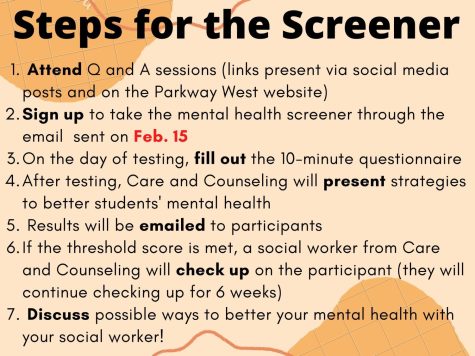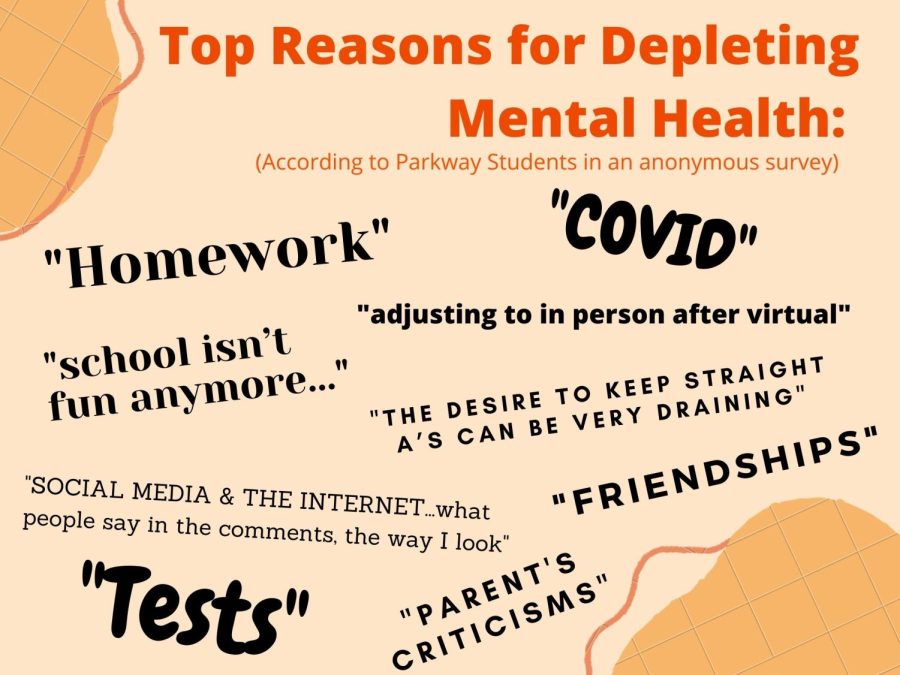Each year, one in six students ages six to 17 experience a mental health disorder. These rates are increasing due to changing COVID-19 protocols. In response to a rise in mental health issues, Parkway has partnered up with mental health organization Care and Counseling to conduct a Student Wellness Program.
The program offers mental health screenings available to sign up for through an email that will be sent out Feb. 15. Through a 10 minute questionnaire, the screening program tests to see if students who meet a certain threshold score require specialized help in the form of therapists, counselors, or psychiatrists provided through Care and Counseling. Dr. Erin Schulte is the lead coordinator for the Student Wellness Program as well as guidance, counseling, and character education in Parkway.
ŌĆ£The ideas for the program started when the Mental Health Task Force at Parkway was discussing ways the mental health needs of our school can be met. One recommendation was instead of being reactive to studentsŌĆÖ needs, we would go up to them and see if there was an issue first,ŌĆØ Schulte said. ŌĆ£The screening process would help detect certain underlying mental health issues before they accelerate and Care and Counseling could find a good fit for specialized help based on the individualŌĆÖs needs and insurance costs.ŌĆØ
The provision of mental health screenings through an outside provider is unique to only a few schools in the Midwest. Information regarding studentsŌĆÖ mental health will remain confidential to them and the outside provider Care and Counseling as much as possible. Parents do however have to give permission for students to participate and The Care and Counseling team is upfront with students about what information they are required to share with parents. A student, choosing to be anonymous, struggles with severe anxiety and a serotonin imbalance, preferring to keep their academics and personal health separate.┬Ā
ŌĆ£I can get really overstimulated very quickly by very simple things. I just have to take care of myself in ways that are a little excessive to some people,ŌĆØ the student said. ŌĆ£I have a private therapist and that is mostly what I use to help me through my mental health issues. I know about the counselor systems [at school] and I do talk to my counselor; [she’s] the nicest person ever. But I’ve always been very scared to reach out beyond a certain point to my school just because I donŌĆÖt want to be judged–I was bullied for many years because of my mental health problems and am fearful of it happening again.ŌĆØ┬Ā
 According to a Pathfinder survey, 7% of students have used mental health provisions from school, while around 40% claim to have below-average mental health.
According to a Pathfinder survey, 7% of students have used mental health provisions from school, while around 40% claim to have below-average mental health.
ŌĆ£Students may prefer not to talk to school adults in order to keep mental health confidentiality from the school. But, other times, while counselors and other social workers at school have some mental health expertise, many students require resources beyond what the school is able to provide. It might better explain why fewer students reach out for school help even when they need it,ŌĆØ Schulte said.
After piloting the program last year, Parkway will now implement it in all high schools, middle schools, and four elementary schools. While the Student Wellness Program is not currently mandatory, Parkway highly encourages it. One student who wishes to remain anonymous feels that the program could be a new take on mental health in Parkway.┬Ā
ŌĆ£I would like to take the screener just to see how I am doing mentally, although I am kind of getting tired of all the surveys given out,ŌĆØ the student said. ŌĆ£I have tried counseling through Parkway in the past, but even then, it felt invasive because all my teachers and counselors knew everything about me. I like that this is from a completely different, outside provider and Parkway doesnŌĆÖt have to know about my results. I can maybe get even better specialists or therapists.ŌĆØ
Schulte has advertised the program through social media posts on ParkwayŌĆÖs Facebook account, parent emails and Zoom Q and A sessions posted on Parkway West HighŌĆÖs website. The first Zoom Q and A was Nov. 15. Additionally, health teachers will be talking about these screeners with their classes.
ŌĆ£I am really hoping [the Student Wellness Program] gets to a point where itŌĆÖs an opt-out instead of a sign-up, kind of like a vision or hearing screening. That way, more students might be able to participate in the Student Wellness Program,ŌĆØ Schulte said. ŌĆ£We need to start taking mental health just as seriously as studentsŌĆÖ physical or academic needs. This program is a step towards not only proactively identifying students who may need a little more help than others but also normalizing discussing mental health and not being scared or ashamed of dealing with these issues.ŌĆØ



![Gazing up from the stage, junior Joseph McCurdy who played Peter Pan in the school play, Lost Girl, sits next to senior Juliana Rogers, who plays Wendy Darling, during a theater rehearsal. McCurdyŌĆÖs passion for theater began when he observed a West High production in middle school. ŌĆ£I've been in the high school theater program since I was a freshman. I've always loved theater, but [what prompted me to join] was [when] I went to see [a performance here] when I was in middle school, and it was super cool,ŌĆØ McCurdy said.](https://pwestpathfinder.com/wp-content/uploads/2025/11/IMG_6535-1200x798.jpeg)

![Standing tall, stacked in a precise formation, the cheer team strikes a signature pose during halftime on Sept. 12 at the varsity football game. Nearly a month after this performance, the cheer team performed at the Missouri Cheerleading Coaches Association (MCCA) regional competition on Oct. 4, 2025. ŌĆ£We've all come [to] work together a lot more,ŌĆØ sophomore Elyssa Philippi said. ŌĆ£We're a lot closer than we were [earlier in the season] and going to state has made us closer [in] trying to work with each other, learn [new] skills and make our team better.ŌĆØ](https://pwestpathfinder.com/wp-content/uploads/2025/11/DSC5139-1.jpg)
![Handing out candy to excited trunk-or-treaters, President of the United Nations ChildrenŌĆÖs Fund club and junior Sara Ashok represents that group. Ashok was eager to participate in this event for multiple reasons. ŌĆ£I really wanted to be a part of the event because I get to help create memories for kids and spend time with my friends, spreading the things [I'm passionate about],ŌĆØ Ashok said.](https://pwestpathfinder.com/wp-content/uploads/2025/11/DSC_8648-1-1200x800.jpg)

![Smiling in a sea of Longhorns, Fox 2 reporter Ty Hawkins joins junior Darren Young during the morning Oct. 3 pep rally. The last time West was featured in this segment was 2011. ŌĆ£[I hope people see this and think] if you come to [Parkway] West, you will have the time of your life because there are so many fun activities to do that make it feel like you belong here. I was surprised so many people attended, but it was a lot of fun,ŌĆØ Young said.](https://pwestpathfinder.com/wp-content/uploads/2025/10/Edited2-1200x798.jpg)
![West High seniors and families listen as a representative of The Scholarship Foundation of St. Louis, Teresa Steinkamp, leads a Free Application for Federal Student Aid (FAFSA) workshop. This session, held in the library, provided guidance on financial aid, scholarships and student loan options. ŌĆ£This event is very beneficial for any seniors who are applying to or considering applying to colleges after high school [because] the cost of college is on the rise for seniors and parents,ŌĆØ college and career counselor Chris Lorenz said.](https://pwestpathfinder.com/wp-content/uploads/2025/09/DSC_4478-1200x778.jpg)
![Senior Kamori Berry walks across the field during halftime at the Homecoming football game on Sept. 12. During the pep assembly earlier that day, she was pronounced Homecoming Queen. ŌĆ£I thought it was nice that the crowd [started] cheering right away. I know [my friends] were really excited for me, and my family was happy because typically non-white people don't win,ŌĆØ Berry said.](https://pwestpathfinder.com/wp-content/uploads/2025/09/DSC7046-Enhanced-NR-1200x798.jpg)


